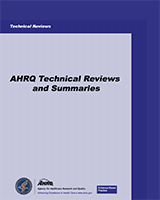NCBI Bookshelf. A service of the National Library of Medicine, National Institutes of Health.
Structured Abstract
Systematic reviews represent a rigorous and transparent approach of synthesizing scientific evidence that minimizes bias. They evolved within the medical community to support development of clinical and public health practice guidelines, set research agendas and formulate scientific consensus statements. The use of systematic reviews for nutrition related topics is more recent. Systematic reviews provide independently-conducted comprehensive and objective assessments of available information addressing precise questions. This approach to summarizing available data is a useful tool for identifying the state of science including knowledge gaps and associated research needs, supporting development of science-based recommendations and guidelines, and serving as the foundation for updates as new data emerge.
Our objective is to describe the steps for performing systematic reviews and highlight areas unique to the discipline of nutrition important to consider in data assessment. Steps involved in generating systematic reviews include identifying staffing and planning for outside expert input, forming a research team, developing an analytic framework, developing and refining research questions, defining eligibility criteria, identifying search terms, screening abstracts according to eligibility criteria, retrieving articles for evaluation, constructing evidence and summary tables, assessing methodological quality and applicability, and synthesizing results including performing meta-analysis, if appropriate.
Unique and at times challenging, nutrition related considerations include baseline nutrient exposure, nutrient status, bioequivalence of bioactive compounds, bioavailability, multiple and interrelated biological functions, undefined nature of some interventions, and uncertainties in intake assessment. Systematic reviews are a valuable and independent component to decision making processes by groups responsible for developing science-based recommendations and policies.
Key words: Systematic review, evidence-based, diet, nutrition recommendations, nutrition guidelines.
Contents
- Preface
- 1. Introduction
- 2. Methods
- Identify Staffing
- Form Multidisciplinary Research Team
- Plan for Outside Inputs
- Develop Analytic Framework
- Develop and Refine Research Questions
- Define Eligibility Criteria
- Identify Search Terms
- Perform Literature Search
- Evaluate Search Results
- Construct Evidence and Summary Tables, and Extract Data
- Assess Methodological Quality and Applicability of Studies
- Perform Meta-analysis, as Appropriate
- Synthesize Results
- 3. Discussion
- Unique Considerations When Conducting Nutrition-Related Systematic Reviews
- Baseline Exposure
- Nutrient Status
- Bioequivalence of Different Chemical Forms of Nutrients
- Bioavailability of Nutrients
- Multiple and Interrelated Biological Functions of a Nutrient
- Undefined Nature of Nutrient Intervention
- Uncertainties in Assessing Dose Response Relationships
- 4. Conclusion
- List of Acronyms/Abbreviations
- References
Prepared for: Agency for Healthcare Research and Quality, U.S. Department of Health and Human Services.1 Contract No. 290-02-0022. Prepared by: Tufts Evidence-based Practice Center, Boston, MA.
Suggested citation:
Lichtenstein AH, Yetley EA, Lau J. Application of Systematic Review Methodology to the Field of Nutrition. (Prepared by the Tufts Evidence-based Practice Center under Contract No. 290-02-0022). AHRQ Publication No. 09-0025. Rockville, MD: Agency for Healthcare Research and Quality. January 2009.
This report is based on research conducted by the Tufts Evidence-based Practice Center (EPC) under contract to the Agency for Healthcare Research and Quality (AHRQ), Rockville, MD (Contract No. 290-02-0022). The findings and conclusions in this document are those of the author(s), who are responsible for its content, and do not necessarily represent the views of AHRQ. No statement in this report should be construed as an official position of AHRQ or of the U.S. Department of Health and Human Services.
The information in this report is intended to help clinicians, employers, policymakers, and others make informed decisions about the provision of health care services. This report is intended as a reference and not as a substitute for clinical judgment.
This report may be used, in whole or in part, as the basis for the development of clinical practice guidelines and other quality enhancement tools, or as a basis for reimbursement and coverage policies. AHRQ or U.S. Department of Health and Human Services endorsement of such derivative products may not be stated or implied.
No investigators have any affiliations or financial involvement (e.g., employment, consultancies, honoraria, stock options, expert testimony, grants or patents received or pending, or royalties) that conflict with material presented in this report.
- 1
540 Gaither Road, Rockville, MD 20850. www
.ahrq.gov
- NLM CatalogRelated NLM Catalog Entries
- Review Application of systematic review methodology to the field of nutrition.[J Nutr. 2008]Review Application of systematic review methodology to the field of nutrition.Lichtenstein AH, Yetley EA, Lau J. J Nutr. 2008 Dec; 138(12):2297-306.
- Cervical spondylotic myelopathy: methodological approaches to evaluate the literature and establish best evidence.[Spine (Phila Pa 1976). 2013]Cervical spondylotic myelopathy: methodological approaches to evaluate the literature and establish best evidence.Skelly AC, Hashimoto RE, Norvell DC, Dettori JR, Fischer DJ, Wilson JR, Tetreault LA, Fehlings MG. Spine (Phila Pa 1976). 2013 Oct 15; 38(22 Suppl 1):S9-18.
- Procedures and methods of benefit assessments for medicines in Germany.[Eur J Health Econ. 2008]Procedures and methods of benefit assessments for medicines in Germany.Bekkering GE, Kleijnen J. Eur J Health Econ. 2008 Nov; 9 Suppl 1:5-29.
- [Procedures and methods of benefit assessments for medicines in Germany].[Dtsch Med Wochenschr. 2008][Procedures and methods of benefit assessments for medicines in Germany].Bekkering GE, Kleijnen J. Dtsch Med Wochenschr. 2008 Dec; 133 Suppl 7:S225-46. Epub 2008 Nov 25.
- Review Screening and Interventions for Childhood Overweight[ 2005]Review Screening and Interventions for Childhood OverweightWhitlock EP, Williams SB, Gold R, Smith P, Shipman S. 2005 Jul
- Application of Systematic Review Methodology to the Field of NutritionApplication of Systematic Review Methodology to the Field of Nutrition
Your browsing activity is empty.
Activity recording is turned off.
See more...
